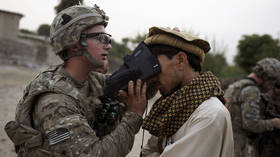Taliban acquires US military biometric devices that can identify Afghans who assisted coalition efforts – reports

The Taliban has reportedly seized US military biometrics equipment that could expose Afghans who helped coalition forces – since they contain identifying data like iris scans and fingerprints as well as biographical information.
An unidentified Joint Special Operations Command (JSOC) official told The Intercept that the Islamist group confiscated the Handheld Interagency Identity Detection Equipment (HIIDE) devices during its offensive push last week. The report was backed up by three former US military personnel.
They told the news outlet that the portable devices could be used to access sensitive information from large, centralized military databases, but noted that it was still unclear how much of the biometric database collected on the Afghan population has been compromised.
According to a US Army Corps of Engineers presentation, HIIDE devices use the data collected to create a “portfolio” that can then be imported into Biometrics Automated Toolset (BAT) identification-processing software as a “digital dossier.” This can be scanned against official watch lists for threats.
Besides tracking insurgents, the Pentagon was also reportedly keen to use the devices to gather unique data on 80% of the Afghan population to check for terrorist and criminal activity. Unnamed sources said biometric details of locals who helped the US were also collected and used in identification cards.
“We processed thousands of locals a day, had to ID, sweep for suicide vests, weapons, intel gathering, etc. ... [HIIDE] was used as a biometric ID tool to help ID locals working for the coalition,” an American military contractor told the outlet.
Also on rt.com White House admits ‘FAIR AMOUNT’ of US weapons fell into Taliban handsIn addition to scanning biometric information from Afghans assisting US military forces, data from locals who were helping with diplomatic efforts was reportedly collected as well.
The International Rescue Committee estimates that over 300,000 Afghan civilians were involved with the American mission over the past two decades.
An unidentified US Army Special Operations source told The Intercept that the Taliban “does not have the gear to use the data” but warned that Pakistan’s Inter-Services Intelligence spy agency had the additional equipment required to process the data from HIIDE devices.
Neither the US Defense Intelligence Agency nor the Office of the Secretary of Defense has commented on the issue as of writing.
“I don’t think anyone ever thought about data privacy or what to do in the event the [HIIDE] system fell into the wrong hands,” Welton Chang, chief technology officer for Human Rights First (HRF) and a former Army intelligence officer, told the outlet.
Moving forward, the US military and diplomatic apparatus should think carefully about whether to deploy these systems again in situations as tenuous as Afghanistan.
HRF is also in the process of putting together a quick guide on avoiding facial recognition technology and biometrics.
Also on rt.com Biden doubles funding for ‘unexpected needs’ of Afghan refugees as ex-interpreter abandoned by Pentagon is BEHEADED by TalibanAs the Taliban advanced into Kabul, Afghan civilians who worked with the US were reportedly caught in a potentially life-or-death predicament over whether to save documents proving their assistance – considered crucial to acquiring a visa out of the country – or destroy them.
According to a Wired magazine report, the Taliban is apparently conducting door-to-door searches to find those who have worked with foreign governments and non-governmental organizations (NGOs).
In 2016, the group reportedly killed 12 passengers on a bus they intercepted after fingerprint scans on a biometric machine identified them as security force workers. An Afghan forces commander confirmed the use of the device – which could “identify security force members from amongst civilians” – to local news outlet TOLOnews at the time.
If you like this story, share it with a friend!














